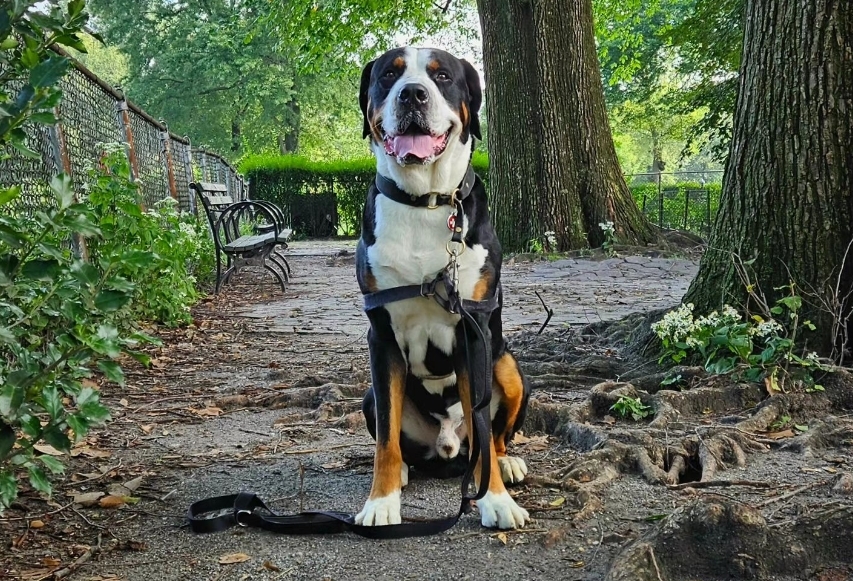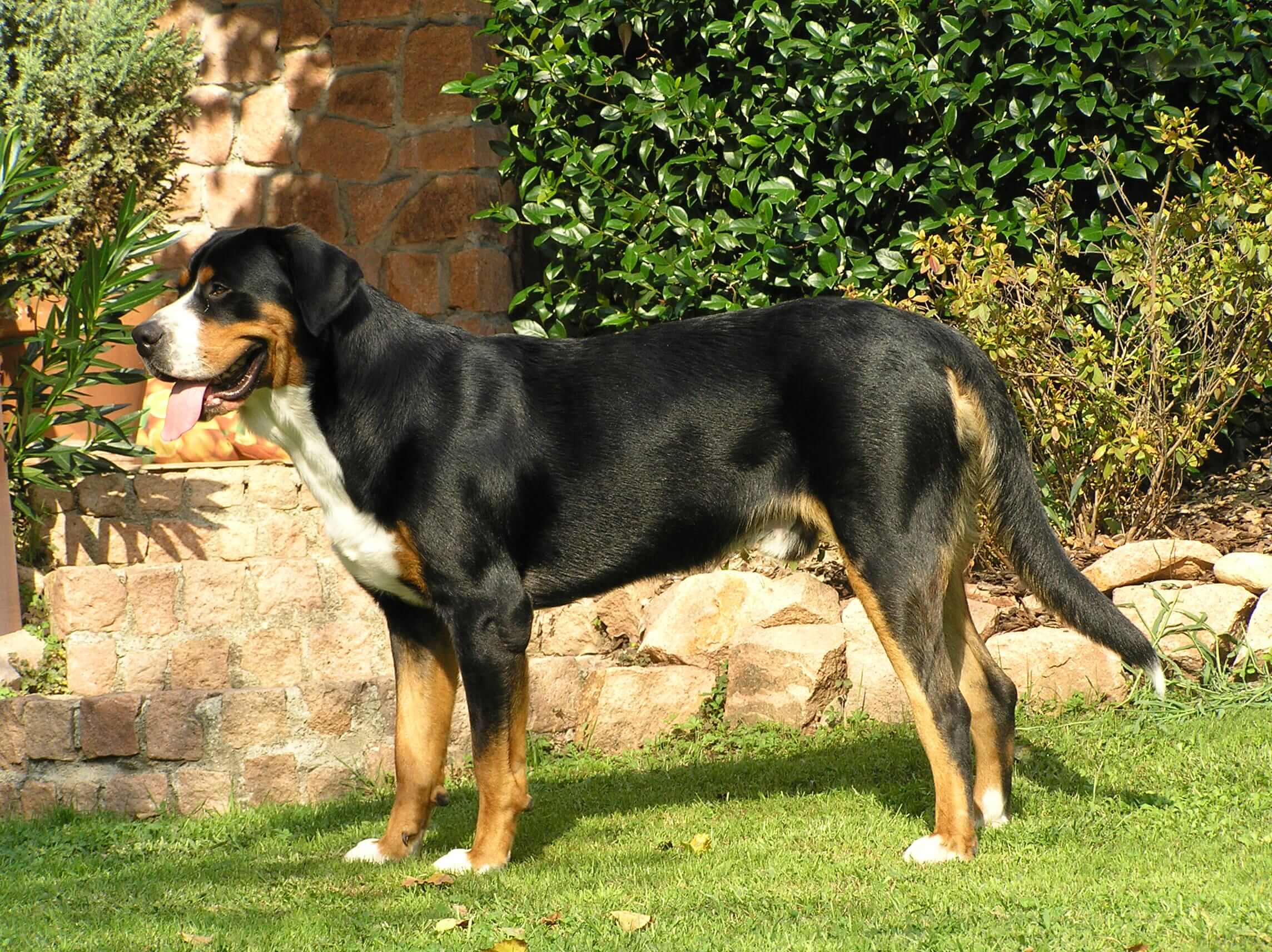The Greater Swiss Mountain Dog, with its commanding presence and gentle demeanor, is a breed that has captured the hearts of dog lovers worldwide.
This magnificent canine, often referred to as the “Swissy,” is known for its striking appearance, exceptional versatility, and unwavering loyalty. In this comprehensive guide, we'll delve deep into the world of the Greater Swiss Mountain Dog, exploring its history, physical attributes, temperament, care requirements, and much more.
Whether you're a prospective owner, a curious enthusiast, or simply looking to learn more about this remarkable breed, this article is your go-to resource.
The History and Origins of the Greater Swiss Mountain Dog
Table of Contents
The Greater Swiss Mountain Dog's history is deeply intertwined with Switzerland's rich heritage. These dogs were originally bred for a variety of purposes, including:
Farm Work and Utility
Greater Swiss Mountain Dogs served as invaluable assets on Swiss farms for generations. Their extraordinary strength and agility made them the perfect companions for a multitude of tasks.
They were frequently employed to pull heavy carts, safeguard livestock from predators, and skillfully herd cattle. These dogs played an indispensable role in the daily operations of Swiss agricultural communities.
Sennenhund Breeds
The Greater Swiss Mountain Dog is part of an illustrious lineage of Swiss mountain dogs collectively referred to as “Sennenhund” breeds. Alongside the Greater Swiss Mountain Dog, this distinguished group includes the Bernese Mountain Dog, Appenzeller Mountain Dog, and Entlebucher Mountain Dog.
Each of these breeds shares a common ancestry, with their unique qualities and attributes reflecting the specific needs of the regions they hailed from.
Near Extinction and Remarkable Revival
In a distressing chapter of their history, Greater Swiss Mountain Dogs faced the ominous specter of near-extinction. Driven by changes in agricultural practices and a declining need for their traditional roles, their numbers dwindled alarmingly.
However, the enduring spirit of dedicated breed enthusiasts emerged as a beacon of hope in the early 20th century. Through their unwavering commitment and diligent efforts, they managed to revive this venerable breed from the brink of oblivion.
Physical Characteristics: What Makes the Swissy Stand Out
The Greater Swiss Mountain Dog, affectionately known as the “Swissy,” is a breed renowned for its distinctive physical attributes that distinguish it from other canine companions. Let's delve into the key elements that make this breed stand out:
- Size and Stature: Swissies are impressive in size, exuding an imposing presence. Adult males typically reach a height ranging from 25.5 to 28.5 inches at the shoulder and weigh between 140 to 160 pounds, while females are slightly more petite. Their robust and well-proportioned build, characterized by a broad chest and sturdy legs, is a testament to their historical role as formidable working dogs.
- Coat Texture and Coloration: The Greater Swiss Mountain Dog boasts a luxurious coat that consists of two layers. The outer layer is smooth and short, providing a sleek appearance, while a dense undercoat offers insulation. Most notably, Swissies are known for their striking tricolor coat pattern. It features a jet-black coat adorned with rich rust-colored markings, which beautifully contrast with the white patches on their chest, muzzle, and blaze.
- Head and Expressive Features: Their facial features are captivating, with expressive eyes being a prominent highlight. The eyes of a Swissy can display hues ranging from hazel to chestnut, adding depth to their charming gaze. The breed showcases a strong, square-shaped head that exudes an air of confidence and purpose. Completing this remarkable visage is their distinctive black nose, harmoniously complementing their tricolor markings.
- Tail Elegance: The Swissy's tail is a symbol of elegance and functionality. It is thick and gracefully carried low, typically extending to reach the hocks. This tail design, tailored to their historical duties, showcases their balance and poise.

Temperament and Personality of the Greater Swiss Mountain Dog
The Greater Swiss Mountain Dog, often referred to as the Swissy, is celebrated not only for its impressive physical characteristics but also for its multifaceted and endearing temperament. Here, we delve into the intricate layers of their personality:
Affectionate and Loyal Companions
Swissies are renowned for their boundless affection and unwavering loyalty. They forge deep emotional connections with their families, often becoming cherished members. Their devotion is unwavering, and they are always eager to shower their loved ones with affection. This strong sense of loyalty extends to their protective instincts, making them exceptional watchdogs who will vigilantly guard their homes and loved ones.
Family-Oriented and Child-Friendly
The Greater Swiss Mountain Dog shines as a family-oriented breed, excelling in the role of a beloved family companion. Their patient and gentle nature is particularly notable when interacting with children. Swissies are known for their exceptional tolerance and adaptability around youngsters, creating a safe and nurturing environment for families with kids.
Alertness and Reserved Demeanor
While Swissies are inherently friendly and sociable, they also possess a natural wariness when confronted with strangers. This alertness to their surroundings and reserved demeanor makes them exceptional watchdogs. They are quick to sense any potential threats and will dutifully alert their family to any unusual activity or visitors.
Intelligence and Trainability
These dogs are not only known for their warm-hearted nature but also for their intelligence. Swissies are highly trainable and thrive on mental stimulation. They readily engage in activities that challenge their minds, making them suitable candidates for obedience training, agility, and other canine sports.
Active and Playful
While they have a calm and composed disposition, Swissies are also known for their playful side. They enjoy physical activities and outdoor adventures with their families. Regular exercise and playtime are essential to keep them happy and healthy.
Is a Greater Swiss Mountain Dog Right for You
Deciding to welcome a Greater Swiss Mountain Dog into your life is a substantial commitment, and it's important to consider various factors before making this choice. Here's a comprehensive look at what you should take into account:
Space Requirements
Swissies are generously proportioned dogs, and their physical size demands ample space for them to move around comfortably. Having a spacious yard or access to open areas is highly recommended to cater to their need for exercise and exploration. Living in a smaller apartment or space-restricted environment might not be ideal for this breed.
Exercise Needs
The Greater Swiss Mountain Dog is a highly active breed that thrives on physical activity. Daily exercise is not just a luxury but a necessity to keep them healthy and content. Plan for regular walks, engaging playtime, and opportunities for them to expend their boundless energy. Failure to meet their exercise needs can lead to behavioral issues and restlessness.
Grooming Requirements
While Swissies have a short coat that is generally easy to maintain, regular brushing is advisable to minimize shedding. Be prepared for seasonal shedding, which can be quite heavy during certain times of the year. Routine grooming routines, including nail trimming and ear cleaning, are also essential to ensure their overall health and well-being.
Training and Socialization
Proper training and early socialization are critical for Greater Swiss Mountain Dogs to develop into well-behaved and balanced companions. Positive reinforcement methods are highly effective with this breed, as they respond well to praise and rewards. Engaging in obedience training and exposing them to various people, animals, and environments during their formative months will help mold them into confident and well-adjusted dogs.
Lifestyle Compatibility
Consider your own lifestyle and daily routine. Swissies thrive in an environment where they can be an integral part of the family. They are known for their affectionate and loyal nature and require human interaction and companionship. If you have a busy schedule that keeps you away from home for extended periods, this breed may not be the best fit for your lifestyle.

Caring for Your Greater Swiss Mountain Dog
Ensuring the well-being of your Greater Swiss Mountain Dog involves a range of vital considerations, each contributing to their overall health and happiness. Here's a detailed look at caring for your Swissy:
- Feeding and Nutrition: Selecting a high-quality dog food that aligns with their nutritional requirements is paramount. Due to their size, it's crucial to avoid overfeeding, as excess weight can lead to obesity and related health issues. Consult with your veterinarian to determine the ideal portion sizes and feeding schedule based on their age, activity level, and individual needs.
- Exercise and Mental Stimulation: Swissies are an active breed with a zest for physical activities. Regular exercise is not only essential for maintaining their physical health but also for keeping them mentally stimulated and preventing boredom. Engage in daily walks, outdoor playtime, and consider activities like hiking or agility training to cater to their energetic nature. Puzzle toys and interactive games can provide mental stimulation.
- Grooming Routine: While the Greater Swiss Mountain Dog has a relatively low-maintenance coat, regular grooming is still necessary. Brush their coat at least once a week to remove loose hair and promote a healthy sheen. Occasional baths should be part of the grooming routine, but be mindful not to overdo it, as excessive bathing can strip their skin of natural oils.
- Healthcare and Vet Visits: Regular veterinary check-ups are fundamental to your Swissy's well-being. Stay up to date with vaccinations, flea and tick prevention, and heartworm protection. These routine visits allow for early detection and prevention of common health issues. Discuss a vaccination schedule and preventive care plan with your veterinarian.
- Common Health Concerns: Being informed about breed-specific health concerns is crucial. Greater Swiss Mountain Dogs can be prone to hip and elbow dysplasia, bloat, and certain genetic conditions. Regular monitoring and early intervention can help manage these risks effectively. Consult with your veterinarian to develop a proactive health plan tailored to your dog's specific needs.
- Socialization and Training: Proper socialization from a young age is vital to ensure that your Swissy becomes a well-adjusted and sociable dog. Enroll in obedience training classes and expose them to a variety of people, animals, and environments. Positive reinforcement methods work well with this breed and can aid in their training and development.
Health Considerations of Greater Swiss Mountain Dogs
Just like any other breed, Greater Swiss Mountain Dogs are prone to certain health issues that demand careful attention and proactive management. Here's an in-depth look at some of the health concerns associated with Swissies:
Hip Dysplasia
Hip dysplasia is a condition where the hip joint doesn't develop properly, leading to potential pain and mobility issues. To mitigate the risk, regular veterinary check-ups are essential. A balanced diet and maintaining a healthy weight can also contribute to joint health. Responsible breeders often screen for this condition to improve the breed's overall hip health.
Bloat (Gastric Torsion)
Bloat is a life-threatening condition that's more common in deep-chested breeds like the Greater Swiss Mountain Dog. It occurs when the stomach twists on itself, cutting off blood flow and trapping gas. To reduce the risk, consider feeding your Swissy smaller, frequent meals rather than one large meal. Additionally, avoid strenuous exercise immediately after eating. Being aware of the signs of bloat, such as restlessness, bloating, and retching, and seeking immediate veterinary assistance is crucial.
Elbow Dysplasia
Elbow dysplasia is another orthopedic concern in Swissies. It's characterized by abnormal development of the elbow joint and can result in lameness and discomfort. To address this issue, responsible breeding practices that involve screening breeding dogs for elbow dysplasia are important. Additionally, maintaining a healthy weight and providing joint supplements, as recommended by your veterinarian, can aid in managing this condition.
Epilepsy
While not exclusive to the Greater Swiss Mountain Dog, epilepsy can affect Swissies. This neurological disorder can result in seizures. If your dog develops epilepsy, regular monitoring and appropriate treatment under the guidance of a veterinarian are essential. Medications can often help manage and reduce the frequency and severity of seizures.
Routine Health Maintenance
In addition to addressing breed-specific health concerns, routine veterinary care is crucial for your Swissy's overall health. Regular check-ups, vaccinations, dental care, and preventive measures such as flea and tick control are essential components of their healthcare regimen.

Training and Socialization of Your Greater Swiss Mountain Dog
To cultivate a well-rounded and well-behaved Greater Swiss Mountain Dog (Swissy), investing in effective training and socialization is paramount. Here's a comprehensive guide to help you in this crucial aspect of your Swissy's development:
Positive Reinforcement
Swissies are highly responsive to positive reinforcement techniques. Utilize rewards such as treats, praise, and affection to reinforce desired behaviors. Encouragement and patience go a long way in building trust and cooperation with your Swissy. Avoid harsh or punitive training methods, as they can be counterproductive and harm the bond between you and your dog.
Socialization from an Early Age
Exposing your Swissy to a diverse array of people, animals, and environments from a young age is pivotal. Early socialization fosters confidence and adaptability, helping your Swissy become well-adjusted and comfortable in various situations. Arrange playdates, visits to dog parks, and encounters with different people to broaden their social horizons.
Obedience Training
Teaching your Swissy basic obedience commands is not only a matter of convenience but also a fundamental safety measure. Commands like “sit,” “stay,” “come,” and “leave it” are essential for their safety and your peace of mind. Enroll in obedience training classes or work with a professional trainer to ensure your Swissy masters these commands effectively.
Consistency and Routine
Consistency is key in Swissy training. Establish clear rules and routines to provide structure and predictability for your dog. Consistent commands and expectations help your Swissy understand what is expected of them, reducing confusion and anxiety.
Exercise and Mental Stimulation
Incorporate physical exercise and mental stimulation into your training regimen. Swissies are intelligent and thrive on mental challenges. Puzzle toys, interactive games, and training sessions that engage their minds are valuable for their overall well-being.
Leash Training
Proper leash training is essential for a Swissy, given their size and strength. Teach them to walk politely on a leash, making walks enjoyable for both of you and ensuring safety when out in public.
Stay Patient and Positive
Training a Greater Swiss Mountain Dog can be a rewarding but sometimes challenging experience due to their independent nature. Stay patient, maintain a positive attitude, and celebrate small victories along the way. Consistent and positive reinforcement will yield long-lasting results.
Frequently Asked Questions (FAQs)
Q1: Are Greater Swiss Mountain Dogs good with other pets?
A1: Swissies can get along well with other pets, especially if they are properly socialized from a young age.
Q2: Do they require a lot of exercise?
A2: Yes, Swissies are an active breed and need regular exercise to stay healthy and happy.
Q3: How long do Greater Swiss Mountain Dogs live?
A3: The average lifespan of a Swissy is around 8 to 11 years.
Q4: Are they good family dogs?
A4: Yes, Greater Swiss Mountain Dogs are known for their gentle and loyal nature, making them excellent family pets.
Conclusion
In conclusion, my journey into the world of the Greater Swiss Mountain Dog, affectionately known as the “Swissy,” has been a deeply personal and enchanting experience. Exploring their rich history, striking physical attributes, and endearing personalities has left an indelible mark on my heart.
Learning about their origins as tireless workers on Swiss farms and their remarkable revival from near-extinction by devoted enthusiasts has instilled in me a profound appreciation for their resilience and historical significance.
What truly sets Swissies apart is their extraordinary temperament – their boundless affection, unwavering loyalty, and family-oriented nature make them not just dogs, but cherished companions.
As I reflect on all that I've discovered about this remarkable breed, I am captivated by their charm and enchanted by their presence, knowing that they have the power to bring joy and loyalty into the lives of those fortunate enough to call them family.
The Greater Swiss Mountain Dog is not just a pet; they become an integral part of one's life, offering unwavering love, affection, and a lifetime of unforgettable moments, making them a breed that will forever hold a special place in my heart.
Sources
https://www.ncbi.nlm.nih.gov/pmc/articles/PMC9317297/
https://www.akc.org/expert-advice/lifestyle/the-greater-swiss-mountain-dog/




